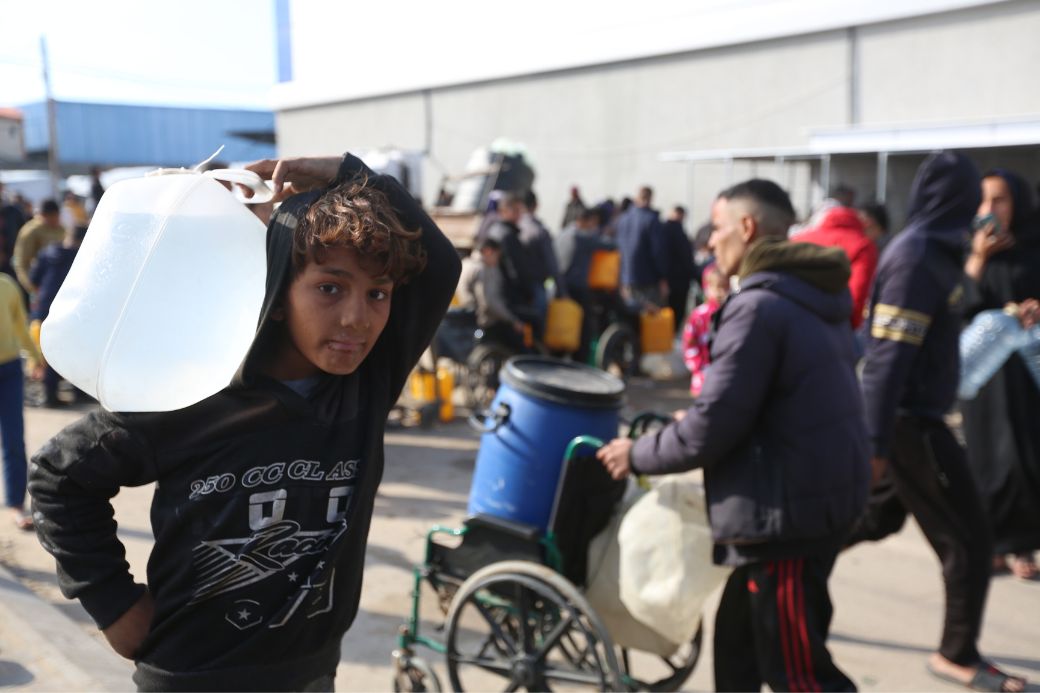We at CESVI have finally entered Gaza from Rafah with a shipment of 18 tons of therapeutic food to save the lives of thousands of children, 80% of the total estimated 4,000 children in a state of extreme malnutrition. It has been a race against time, but now we are preparing for distribution.
After 5 long months of war, the entire Gaza Strip is on its knees. Death, devastation, hunger, misery – this is what Gaza is experiencing, where millions of people are on the brink of despair. The war statistics are terrifying: more than 30,000 dead, 1.7 million people (over 75% of the population) displaced, with one million residing in emergency or informal shelters.
Further aggravating the situation is the state of food insecurity that the entire population is facing, as they have nothing left to eat. In addition to the lack of food, there is a scarcity of clean water, sanitary facilities, and healthcare. Children are starting to die from malnutrition and dehydration. 335,000 children under the age of 5 are in serious danger due to malnutrition. According to the FAO, the entire food supply chain in Gaza has been severely disrupted, cultivated lands and greenhouses destroyed, groundwater unfit for consumption, and livestock compromised. Living conditions are deteriorating rapidly.
“The problems we face are numerous: in addition to the constant threat of violence, we also have to deal with inflation. The cost of food is skyrocketing: sugar is at 80 shekels. To make a simple cup of tea in the morning, I must consider the cost of cooking gas, tea itself, sugar, and water,” says a man in Gaza. “Where do we find these ingredients? How can we afford fresh vegetables when they are so expensive? We’re tired of eating canned food, but we can’t afford anything else. We struggle every day to put food on the table, to ensure our children even have their daily bread. We can’t even afford a biscuit for our children. We are desperate, but we must fight, for ourselves and for future generations,” he concludes.
“My main concern is my children. I need daily diapers for them, milk for the youngest. The cost of a carton of milk is 27 shekels, an expense that weighs heavily on our already precarious finances. Even diapers are a luxury we can’t afford,” says a woman. “The cost of living has become very high. Before the war, we could afford six kilograms of tomatoes for a few shekels, today not even two tomatoes for breakfast are within our reach. Even bread, a basic necessity, has become a luxury. Bakeries sell one piece for 5 shekels. We need support to guarantee a better future for our children and to live with dignity,” she concludes.
Access to humanitarian aid is extremely complex. In February, around 97 aid trucks entered Gaza per day, compared to 150 in January. In addition to entry difficulties, there are enormous security problems in aid distribution, as demonstrated by what happened on Thursday, February 29, when over 100 civilians were hit and killed and more than 700 were injured as they crowded desperately around humanitarian trucks.
Fortunately, our aid has not been affected and is ready to be distributed. Despite all the difficulties, we will soon be able to deliver food to families for their suffering children.
Help us continue our interventions to save the population of Gaza from hunger and despair. Support our emergency fund, and you will help us give hope.
